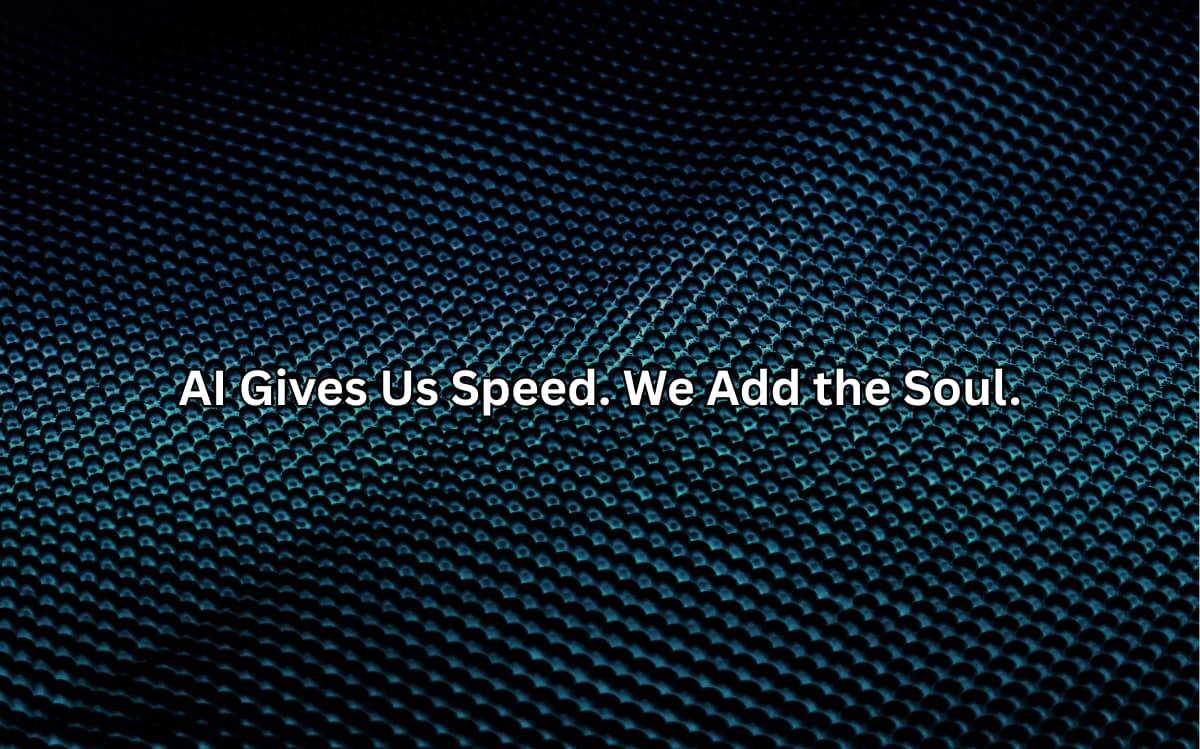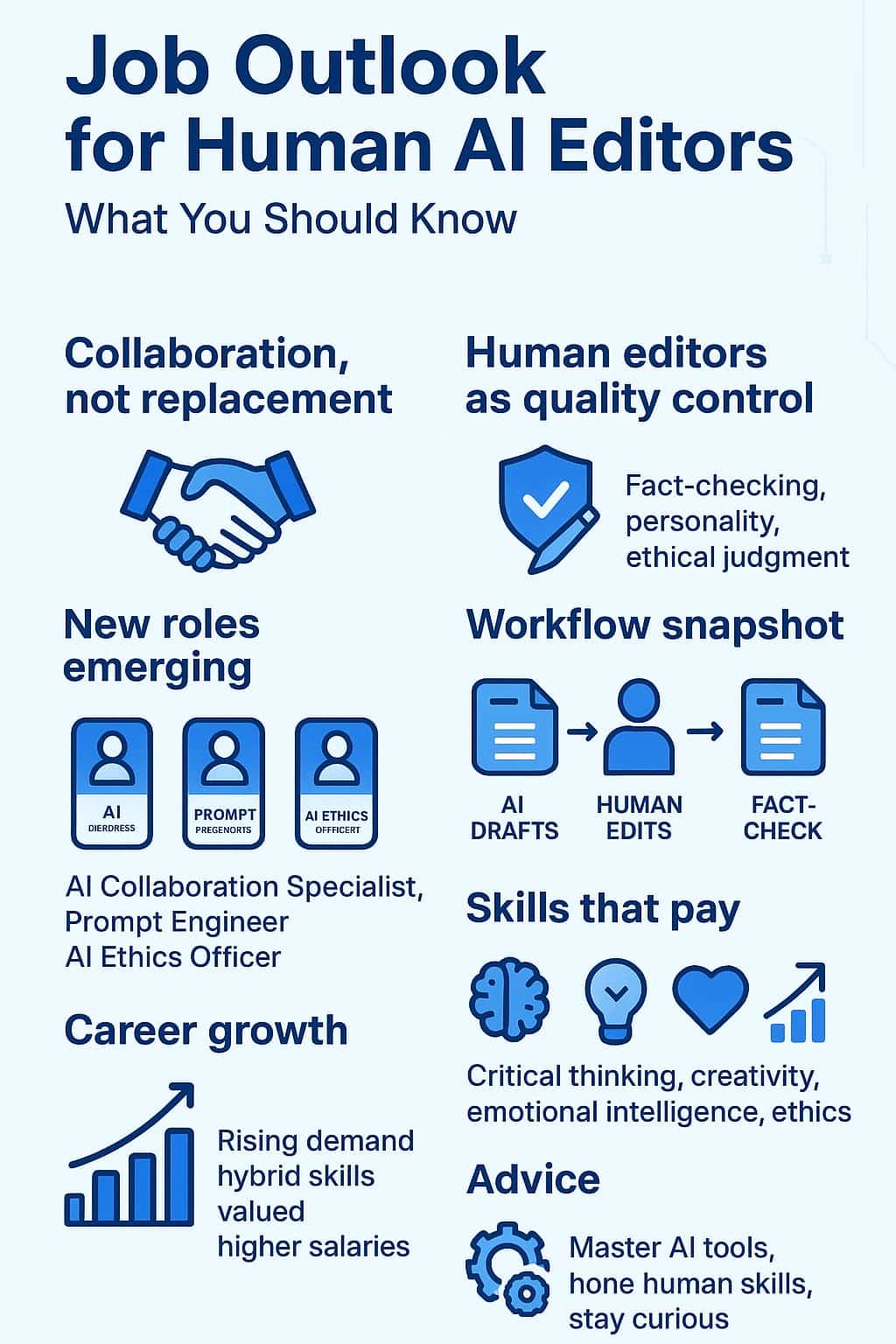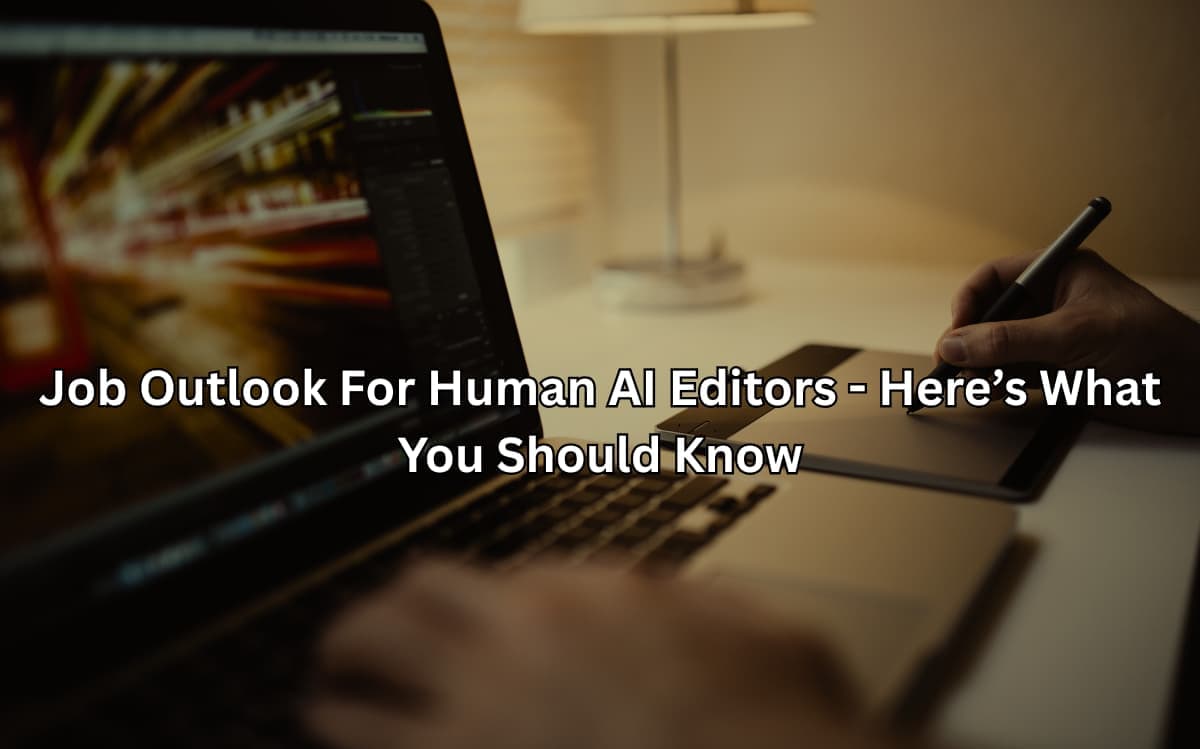Let’s be honest: the job outlook for human AI editors is fantastic. A few years ago, many of us in the content world felt a knot in our stomachs, wondering if we were about to be automated out of a job. But what we’ve seen happen is the exact opposite.
Instead of replacing us, AI has created a massive demand for a new kind of expert: someone who can guide it, fix its mistakes, and turn its robotic drafts into something truly human. [1] This isn’t just a trend; it’s a fundamental shift in how great content gets made. Let’s break down what’s really happening out there.
Key Takeaways
- This isn’t about replacement; it’s about collaboration. The job isn’t gone, it’s just changed. Companies now need editors who can work with AI, not against it.
- You are the quality control. AI is fast, but it’s often wrong, biased, or soulless. The human editor is the final, essential checkpoint for accuracy and authenticity.
- The money follows the new skills. Combining classic editing talent with a solid understanding of how to manage AI makes you incredibly valuable, and salaries are reflecting that.
We Were Worried, Too. Here’s What Actually Happened.
Credits: CNBC Televions
A couple of years back, there was a real sense of panic in our world. Every other headline was about how generative AI was coming for creative jobs. As a company built on creating high-quality content, we had some long conversations about what the future held. Were we training the very tools that would make us obsolete?
But then we started using them. Seriously using them, day in and day out. And we quickly realized the narrative was wrong. AI wasn’t a replacement for a skilled editor; it was more like a super-fast, slightly clumsy apprentice. It could get a first draft done in minutes, but that draft was almost never ready for the real world. It needed guidance, fact-checking, and a serious dose of personality.
That’s when we saw the real opportunity. The demand wasn’t for less human oversight, but for a more skilled human oversight that defines the future of human AI content editors. At Jet Digital Pro, we stopped looking for just editors and started looking for people who could become AI-wranglers, critical thinkers who could see the potential in a machine’s output but weren’t afraid to tear it apart and rebuild it to meet a human standard.
So, What Do These New Jobs Actually Look Like?
You’re starting to see a whole new class of job titles popping up that didn’t really exist before. They all revolve around this human-machine partnership. On our team and across the industry, roles are evolving into things like:
- Human-AI Collaboration Specialist: Think of this as the project manager for AI-assisted content. They’re the ones who understand the whole process, from crafting the perfect prompt to giving the final human sign-off.
- Prompt Engineer: This sounds way more technical than it often is. At its heart, it’s about learning to communicate effectively with a machine. It’s part logic, part creative writing, and part psychology, figuring out the exact words to get the AI to give you what you actually want.
- AI Ethics Officer: This is a big one. As companies produce more content with AI, someone needs to be the conscience. This person asks the tough questions: Is this content fair? Is it reinforcing harmful stereotypes? Could this be misinterpreted?
The common thread is that these jobs aren’t about just pressing a button. They’re about steering, refining, and taking responsibility for the final product.
AI Gives Us Speed. We Add the Soul.

One of the biggest hurdles is shifting from seeing AI as a competitor to embracing human-AI collaboration in editing.
We encourage our team to think of it as a tool that handles the grunt work. By letting a machine rough out an article structure or generate a bland first pass, we free up our brilliant human editors to spend their time on the high-value tasks that actually make a difference. [2]
Let Me Walk You Through a Real Project
Imagine a new assignment lands on one of our editor’s desks. In the old days, they’d be staring at a blank page. Now, the process looks more like this:
- The Strategy Session: First, the editor doesn’t just write. They think. They craft a detailed prompt for the AI, telling it the audience, the tone (e.g., “be helpful and witty, not corporate and stuffy”), the key points to hit, and, just as importantly, what not to say.
- The First Look: The AI spits out its draft. Our editor reads it, not for typos, but for potential. They might keep two paragraphs, delete three, and flag one section that needs a complete, from-scratch human rewrite.
- The Detective Work: This is where the human element is non-negotiable. Our editor becomes a fact-checker. Did the AI invent a statistic? Did it cite a non-existent expert? We’ve seen it happen. The editor verifies everything, because trust is everything.
- The Personality Transplant: Now, the real magic happens. The editor takes the sterile, AI-generated sentences and injects the client’s voice. They add a short story, a clever metaphor, or a touch of humor. They make it sound like it was written by a person, for a person.
- The Final Polish: They’ll check the flow, optimize it so people can actually find it on Google, and ensure it’s not just accurate, but genuinely helpful and interesting to read.
That final piece of content isn’t “AI-generated.” It’s “human-crafted, with AI assistance.” And that distinction is everything. The content that works, the stuff that people read, share, and remember, always has that human soul at its core.
The Career Outlook: Is This a Safe Bet?

Alright, let’s get to the bottom line. Is this a good career to get into right now? Absolutely. We are constantly on the lookout for people with this hybrid skillset, and frankly, there aren’t enough of them. The industry is booming, and companies are realizing that cutting corners with 100% AI content is a recipe for disaster. They need a human in the loop.
Why You’ll Have Job Security
The reason this role is so secure is that it’s built on skills that are famously difficult to automate. While an AI can process data, it can’t (yet) replicate the core human traits that define a great editor. When we hire, this is the stuff we’re really looking for:
- Genuine Critical Thinking: The ability to look at a sentence that is grammatically perfect and say, “Yes, but is it true? Is it wise?”
- Creativity and Storytelling: The spark that connects an idea to a human emotion. AI is a great mimic, but it’s not an originator of heartfelt stories.
- Emotional Intelligence: Understanding how a reader will feel when they read a certain phrase. It’s the empathy to know when to be gentle, when to be bold, and when to be funny.
- Ethical Judgment: Having that internal compass to know when a piece of content crosses a line from persuasive to manipulative, or from informative to biased.
The career path isn’t just about being a better editor anymore. It’s about becoming a content strategist, a quality manager, or an ethical lead. The ceiling is getting much higher.
Getting the Skills to Pay the Bills

So, understanding how human editors adapt to AI involves a mix of embracing new tech while doubling down on timeless skills. The technology will change next year, but the principles of good communication won’t.
It’s Not Just About the Tech
Yes, you need to be comfortable with the tools. That means getting in there and playing with different AI platforms. See what they’re good at, learn their quirks, and figure out how to write prompts that get you 80% of the way there. But the technology is the easy part. The harder, more valuable part is honing your human expertise.
- Become a Vicious Fact-Checker: Don’t trust anything the AI tells you without verification. Learn to trace information back to its primary source.
- Develop Your Voice: Understand the nuances of brand voice so you can spot when an AI’s output feels generic or “off.”
- Think About the User: Know the basics of how people find and read content online (SEO). Your job is to make content that is not only well-written but also discoverable and useful.
The Most Important Skill of All
More than anything, the key to success in this field is curiosity. You have to be willing to constantly learn. The AI models we use today are already being replaced by better ones. The strategies that work now might be outdated in six months. You have to have a mindset that embraces change and sees it as an opportunity to get better. This isn’t a stagnant field; it’s an adventure. And for the right kind of person, it’s one of the most exciting career paths you can choose today.
Frequently Asked Questions
Will AI take all the editing jobs?
No, AI is not taking all editing jobs. Instead, it is changing them. AI can write a fast first draft, but it still needs a person to check for mistakes, add personality, and make sure all the facts are true. The human editor is more important than ever for quality.
What does a human AI editor do all day?
A human AI editor works with content made by computers. They read it, fix errors, and check facts. They also rewrite parts to make them sound more interesting and human. Their main goal is to make sure the final piece is accurate, clear, and easy for people to read.
Do I need to be a coding expert for this job?
Not at all! You do not need to know how to code. You just need to be good at writing and editing, and be open to learning how to use new tools. The job is more about being a great communicator and a careful thinker than being a tech genius.
Is being a human AI editor a good career choice?
Yes, it is a very good career choice right now. As more companies use AI, they need skilled people to manage the content it creates. This means many new jobs are opening up, and they often pay well. The need for these skills is growing quickly.
How can I start learning to be an AI editor?
You can start by using free AI writing tools online. Give them instructions to write something, and then practice editing the result. Focus on improving your own writing and fact-checking skills. Reading and writing every day will help you become a better editor for any type of content.
Why the Human Element is Your Competitive Edge
So, what’s the final word? The job outlook for human AI editors isn’t just promising; it’s essential. The best content will always come from talented people who can steer AI, not just use it. For digital agencies, building an in-house team with this unique skill set is a huge challenge.
We’ve built our entire white-label model to solve this problem, providing the expert human-AI teams you need to scale your SEO services effortlessly. If you’re ready to grow without the hiring headache, we’re here to help.
Learn how we can support your agency by contacting us.
References
- https://www.salesforce.com/agentforce/human-ai-collaboration/
- https://www.techspot.com/news/109297-human-expertise-demand-fix-flaws-ai-generated-work.html
Related Articles
- https://jetdigitalpro.com/future-of-human-ai-content-editors/
- https://jetdigitalpro.com/how-human-editors-adapt-to-ai/
- https://jetdigitalpro.com/human-ai-collaboration-in-editing/

